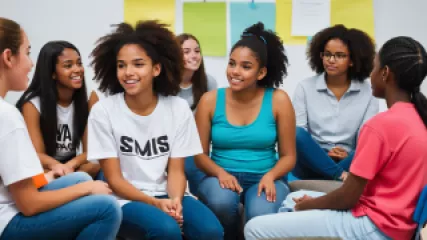How to Organize Teenage Mental Health Workshops: A Step-by-Step Guide
Welcome to the step-by-step guide on how to organize teenage mental health workshops. Adolescence can be a challenging time for many young people, and providing them with the necessary resources and support is crucial for their well-being. Teenage mental health workshops offer a safe space for teenagers to learn about mental health, build resilience, and develop coping strategies. By organizing these workshops, you can make a positive impact on the lives of young individuals who may be struggling with their mental health.
Step 1: Define the Purpose and Goals
Before diving into the logistics of organizing a teenage mental health workshop, it's essential to define the purpose and goals of the event. Consider what you hope to achieve through the workshop and how it aligns with the needs of the target audience. Are you aiming to raise awareness about mental health issues, provide coping skills, or connect teenagers with mental health resources? Clearly outlining your objectives will help guide the planning process.
Step 2: Identify Your Target Audience
Identifying your target audience is a crucial step in tailoring the content and approach of the workshop. Consider the specific demographic you want to reach and the unique challenges they may face. For example, you may want to focus on topics like stress management, self-esteem, or coping with academic pressure. Understanding your audience will allow you to create relevant and engaging workshop content.
Step 3: Research and Gather Resources
Before designing the workshop curriculum, invest time in researching and gathering relevant resources. Look for reputable sources such as mental health organizations, research papers, and educational materials specifically targeting teenage mental health. These resources will provide you with valuable insights and evidence-based strategies to include in your workshop.
Additionally, consider reaching out to local mental health professionals, counselors, or youth organizations who may be willing to contribute their expertise or collaborate with you in organizing the workshop. Their input can enhance the overall quality and credibility of the event.
Step 4: Develop the Workshop Curriculum
Based on your research and gathered resources, develop a comprehensive workshop curriculum. Outline the key topics you want to cover and create an engaging flow that keeps participants actively involved. Incorporate a mix of interactive activities, group discussions, and informative presentations to cater to different learning styles.
Ensure that the curriculum is age-appropriate, easy to understand, and addresses the specific needs of the target audience. Remember to include practical tools and strategies that participants can apply in their daily lives to promote positive mental health.
Step 5: Secure Funding and Resources
Organizing a workshop typically requires funding to cover expenses such as venue rental, materials, guest speakers, and promotional efforts. Seek out potential sponsors or grants that align with your objectives. Local businesses, community organizations, and government agencies may be willing to support your cause. Prepare a detailed budget proposal outlining how the funds will be used and the potential impact of the workshop.
In addition to financial support, consider collaborating with local schools, community centers, or mental health organizations that can provide resources such as venues, equipment, or volunteer assistance. Building partnerships can significantly enhance the success of the workshop.
Step 6: Plan Logistics and Promotion
Once you have secured the necessary resources, it's time to plan the logistics of the workshop. Determine the date, duration, and location of the event based on the availability of your target audience and venue options. Ensure that the venue is accessible, comfortable, and conducive to learning.
Develop a marketing and promotion strategy to attract participants. Utilize various channels such as social media, school newsletters, community bulletin boards, and local newspapers to spread the word about the workshop. Collaborate with schools, youth organizations, and mental health professionals to reach a wider audience.
Step 7: Execute the Workshop
The day of the workshop has arrived! Make sure to arrive early to set up the venue, test equipment, and prepare any necessary materials. Create a welcoming atmosphere by arranging the space in a way that encourages interaction and engagement.
Throughout the workshop, maintain an empathetic and non-judgmental environment. Encourage participants to share their thoughts, ask questions, and actively participate in activities. Be prepared to address any concerns or sensitive topics that may arise during the session.
Step 8: Evaluate and Follow Up
After the workshop concludes, take the time to evaluate its impact and gather feedback from participants. Consider distributing anonymous surveys to assess the effectiveness of the content, activities, and overall experience. This feedback will help you refine future workshops and improve your approach.
Follow up with participants by providing additional resources, contact information for local mental health services, or information about ongoing support groups. Maintain communication to ensure that the impact of the workshop extends beyond the event itself.
Remember, organizing teenage mental health workshops is a collaborative effort that requires compassion, dedication, and careful planning. By providing teenagers with valuable tools and resources, you can empower them to navigate the challenges of adolescence and promote positive mental health.Source






